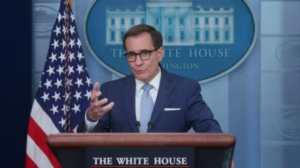
The United States on Wednesday expressed cautious optimism about the possibility of a joint declaration emerging from the upcoming G20 Summit while acknowledging the challenges of aligning the diverse interests of the participating nations.
When asked about the prospects of a joint communique at the upcoming G20 Summit in New Delhi, John Kirby, the National Security Council (NSC) Coordinator for Strategic Communication, said, “We certainly hope so. But, I think you know it’s difficult to get 20 clocks to chime at the same time; we’re going to work on this. We know that the Indians also would like to see a joint communique…so we’ll see where it goes.”
The G20, comprised of major economies from around the world, has often struggled to reach a consensus on key issues due to differing priorities and political stances among its member nations.
Kirby highlighted that one of the key obstacles to reaching a joint declaration could be the ongoing conflict in Ukraine. He noted that countries like Russia and China have historically been less inclined to sign onto language that is in alignment with the rest of the international community.
“Oftentimes, the sticking point tends to be the war in Ukraine because countries like Russia and China are less likely to sign on to language that the rest of the international community is more comfortable signing on to, so we’ll see where it goes,” Kirby said.
The situation in Ukraine has been a point of contention among G20 members, with Western nations often calling for stronger condemnations of Russia’s actions in the region.
The G20 member countries represent around 85 per cent of the global GDP, over 75 per cent of the global trade, and about two-thirds of the world population.
The grouping comprises Argentina, Australia, Brazil, Canada, China, France, Germany, India, Indonesia, Italy, Japan, the Republic of Korea, Mexico, Russia, Saudi Arabia, South Africa, Turkey, the UK, the US and the European Union (EU).
Source- Hindustan Times.



